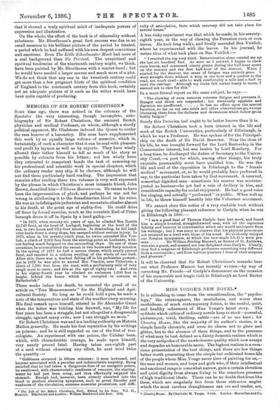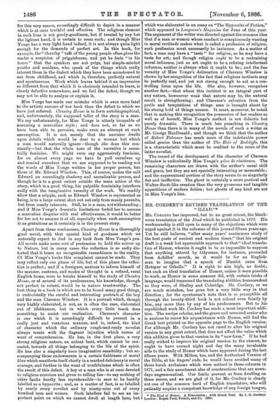MISS YONGE'S NEW NOVEL.•
Ix is refreshing to come from the sensationalism, the " psycho- logy," the extravagance, the morbidness, and worse than morbidness, of much contemporary fiction, to the restful, quiet, and healthy refinement of Miss Yonge's latest story. The epithets which critics of ordinary novels keep in stock—powerful, picturesque, vivid, thrilling, subtle—are of no use here ; for Chantry House, like the majority of its author's stories, is a simple family chronicle, and owes its charm not to glare and glitter, but to the absence of these things, and to the presence of what may be best defined as a dainty domestic realism which is the very antipodes of the unwholesome quality which now usurps and degrades an honourable name. The highest realism is a vera- cious presentation of the best things, and there are few things better worth presenting than the simple but cultivated home-life of the people whom Mies Yonge never tires of painting for us,— the men and women, and boys and girls who, if their intellectual and emotional range is somewhat narrow, gain a certain elevation and quiet dignity from always living in the conscious presence of high traditional ideals. There can be no doubt that lives like these, which are singularly free from those obtrusive angles which the most careless draughtsman can see and render, are,
* Chantey Howls. By Charlotte IL Yongs. E vol s. London Macmillan and Co.
for this very reason, exceedingly difficult to depict in a manner which is at once truthful and effective. The religions element in such lives is not goody-goodiness, but if treated by any but the lightest hand, it is certain to seem such; and though Miss Yonge has a very light hand indeed, it is not always quite light enough for the demands of perfect art. In this book, for example, the" churchy " tak of the young people often gives the reader a suspicion of priggishness, and yet he feels "in his bones " that the speakers are not prigs, bat simple-minded youths and maidens, who speak of the things which really interest them in the dialect which they have been accustomed to use from childhood, and which is, therefore, perfectly natural and spontaneous. Work which leaves behind it an impression so different from that which it is obviously intended to leave, is clearly defective somewhere, and we feel the defect, though we may not be able to analyse or explain it.
Miss Yonge has made one mistake which is even more fatal to the artistic success of her book than the defect to which we have just referred. Chantry House is in form autobiographical, and, unfortunately, the supposed teller of the story is a man. We say unfortunately, for Miss Yonge is utterly incapable of assuming a masculine style ; and does not, so far as we have been able to perceive, make even an attempt at such assumption. It is not merely that the narrator dwells upon details which would be dear to a woman but which a man would naturally ignore—though she does this con- stantly—but that the whole tone of the narrative is essen- tially feminine. We might even say aggressively feminine, for on almost every page we have to pull ourselves up and remind ourselves that we are supposed to be reading not the words of Miss Yonge written in her proper person, but those of Mr. Edward Winslow. This, of course, makes the said Edward an exceedingly shadowy and unrealisable person, and though he is to a great extent outside the main action of the story, which is a good thing, his palpable femininity interferes sadly with the imaginative veracity of the work. We readily allow that a cripple, such as Edward Winslow is represented as being, is to a large extent shut out not only from manly pursuits, but from manly interests. Still, he is a man, notwithstanding ; and if Miss Yonge's dramatic limitations forbid her to assume a masculine disguise with real effectiveness, it would be better for her not to assume it at all, especially when such assumption is as gratuitous as it certainly is in the present story.
Apart from these weaknesses, Chantry House is a thoroughly good novel, with that special kind of goodness which we naturally expect to find in any book from Miss Yonge's pen. All novels make some sort of pretension to hold the mirror up to Nature, but in many cases the reflection is so sadly dis- torted that it bears no recognisable resemblance to the reality. Of Miss Yonge's books this complaint cannot be made. They may reflect only one phase of life, but of this phase the reflec- tion is perfect ; and if a foreigner, anxious to inform himself of the manner, customs, and modes of thought in a refined, rural English home, were to betake himself to the study of Chantry House, or of several of its predecessors, his knowledge, though not perfect in extent, would be in nature trustworthy. The best thing in a book in which are to be found many good things, is undoubtedly the careful and interesting portrait of the boy and the man Clarence Winslow. It is a portrait which, though very highly elaborated, is not, as is often the case, elaborated out of lifelikeness, but in which every little touch does something to assist our realisation. Clarence's character is one which it is exceedingly difficult to present in a really just and veracious manner, and is, indeed, the kind of character which the ordinary rough-and•ready novelist always treats with the flagrant injustice which comes of want of comprehension. He has, in the first place, a very strong religions nature, an ardent bent, which cannot be con- cealed, towards all things belonging to the life of the spirit. He has also a singularly keen imaginative sensibility ; but ac- companying these endowments is a certain flabbiness of moral fibre which manifests itself chiefly in a marked deficiency in moral courage, and farther in the want of truthfulness which is often the result of this defect. A boy or a man who is at once devoted to religious exercises and given to telling lies—to say nothing of other faults hardly less reprehensible—is sure to be hastily labelled as a hypocrite ; and, as a matter of fact, is so labelled by nearly every novelist and by ninety-nine out of every hundred men and women. Such labellers fail to see an im- portant point on which we cannot dwell at length here, but
which was elaborated in an essay on "The Hypocrite of Fiction," which appeared in Longman's Magazine for June of this year. The argument of the writer was directed against the common idea that if a man or woman whose conduct is conspicuously wanting in moral rectitude makes what is called a profession of religion, such profession must necessarily be insincere. As a matter of fact, a man may have a "taste" for religion, as he may have a taste for art; and though religion ought to be a restraining moral influence, just as art ought to be a refining intellectual influence, neither is always what it ought to be ; and the fine veracity of Miss Yonge's delineation of Clarence Winslow is shown by her recognition of the fact that religions instincts may be perfectly real, and yet not strong enough to act as a con- trolling force upon the life. She also, however, recognises another fact,—that where this instinct is an integral part of any nature, howsoever weak that nature may be, the natural result is strengthening; and Clarence's salvation from the perils and temptations of things seen is brought about by his strong hold of things unseen. It must, moreover, be noted that in making this recognition the possession of her readers as well as of herself, Miss Yonge's method is not didactic but purely dramatic. There is much less preaching in Chantry House than there is in many of the novels of such a writer as Mr. George MacDonald ; and though we think that the author of Robert Falconer has much more of the indefinable power called genius than the author of The Heir of Redclffe, this is a characteristic which mast be credited to the score of the latter novelist.
The record of the development of the character of Clarence Winslow is undoubtedly Miss Yonge's piece de resistance. The remaining characters are drawn with the author's usual skill and grace, but they are not specially interesting or memorable ; and the supernatural portion of the story seems to us singularly flat and ineffective. The ghost is certainly a more poetical and Walter-Scott-like creation than the very gruesome and tangible apparitions of modern fiction; but ghosts of any kind are not in Miss Yonge's line.















































 Previous page
Previous page